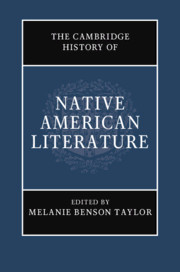Book contents
- The Cambridge History of Native American Literature
- The Cambridge History of Native American Literature
- Copyright page
- Contents
- Figures
- Contributors
- Introduction: What Was Native American Literature?
- Part I Traces and Removals (Pre-1870s)
- Part II Assimilation and Modernity (1879–1967)
- 7 The Multiplicity of Early American Indian Poetry
- 8 Native American Literature in the 1930s
- 9 Black-Indian Literature under Jim Crow
- 10 Transatlantic Modernity and Native Performance
- 11 American Indian Literature and Post-Revolutionary Mexico
- 12 I Kū Mau Mau (Standing Together): Native Hawaiian Literary Politics
- 13 Native Women’s Writing and Law
- Part III Native American Renaissance (Post-1960s)
- Part IV Visions and Revisions: 21st-Century Prospects
- Index
- References
10 - Transatlantic Modernity and Native Performance
from Part II - Assimilation and Modernity (1879–1967)
Published online by Cambridge University Press: 18 September 2020
- The Cambridge History of Native American Literature
- The Cambridge History of Native American Literature
- Copyright page
- Contents
- Figures
- Contributors
- Introduction: What Was Native American Literature?
- Part I Traces and Removals (Pre-1870s)
- Part II Assimilation and Modernity (1879–1967)
- 7 The Multiplicity of Early American Indian Poetry
- 8 Native American Literature in the 1930s
- 9 Black-Indian Literature under Jim Crow
- 10 Transatlantic Modernity and Native Performance
- 11 American Indian Literature and Post-Revolutionary Mexico
- 12 I Kū Mau Mau (Standing Together): Native Hawaiian Literary Politics
- 13 Native Women’s Writing and Law
- Part III Native American Renaissance (Post-1960s)
- Part IV Visions and Revisions: 21st-Century Prospects
- Index
- References
Summary
This chapter analyzes Native performers’ visits to London in the nineteenth century, their mobility, and their self-conscious negotiations with the modern world. It emphasizes their resistance to the stereotypes through which impresarios, audiences, and commentators sought to circumscribe them. It considers the visits made by the Ojibwe who traveled with George Catlin in the 1840s, and the performers who appeared with Buffalo Bill later in the century, among others, discussing how they pushed back against the framing narratives of “savagery” and the “vanishing Indian.” It explores in detail the two London visits made by Pauline Johnson, her social and cultural interactions, and the apparent ease with which she navigated the slippage between her Mohawk heritage and London drawing rooms and theatres at Empire’s high point. Distinctive as Johnson was, she comes at the end the end of a long line of visitors who both exploited, and destabilized, familiar cultural stereotypes.
Keywords
- Type
- Chapter
- Information
- The Cambridge History of Native American Literature , pp. 182 - 196Publisher: Cambridge University PressPrint publication year: 2020

